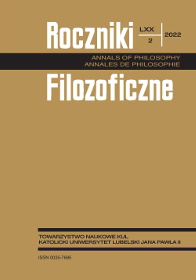Integral Ecology and Anthropocentrism: John Milbank’s Ecological Personalism
Integral Ecology and Anthropocentrism: John Milbank’s Ecological Personalism
Author(s): Jakub GużynskiSubject(s): Philosophy, History of Philosophy, Contemporary Philosophy
Published by: Towarzystwo Naukowe KUL & Katolicki Uniwersytet Lubelski Jana Pawła II
Keywords: integral ecology; antrophocentrism; ecological personalism; trans-organicity; anti-secularism
Summary/Abstract: The article discusses the ecological aspects of John Milbank’s thought in the context of the growing climate crisis. For this purpose, the concept of integral ecology is interpreted in the spirit of Milbank’s integralism, which rejects the notion of “pure nature” as a manifestation of secularism and calls for theological grounding of the environmental discourse. This perspective allows us to see the limitations of the modern way of thinking, caught up in the metaphors of “conquest of nature” and “return to nature.” As an alternative, the concept of “kenotic anthropocentrism” is proposed, which sees man as a rational, social, creative and religious animal, that somehow transcends his own nature, being called to union with God. On the one hand, such an approach proclaims the ontological superiority of man over other creatures, and on the other, it reminds us of his role as the guardian—and not the owner—of the Earth. Thus, it differs significantly from Clive Hamilton’s “modest anthropocentrism,” whose call to care for the environment is ultimately based on arbitrary freedom and the imperative of self-preservation. Milbank’s position is closer to Bruno Latour’s (anti-)anthropocentrism emphasizing the role of man as a political representative of silent earthlings—rivers, mountains and animals. However, Milbank advocates a strong ontological hierarchy rejected by Latour, which makes him less sensitive to the material dimension of climate change. Moreover, Milbank’s militant anti-secularism may be an obstacle to a much needed broader discussion of the ecological crisis, even if his critique of modernity is hard to ignore.
Journal: Roczniki Filozoficzne
- Issue Year: 70/2022
- Issue No: 2
- Page Range: 35-52
- Page Count: 18
- Language: English

